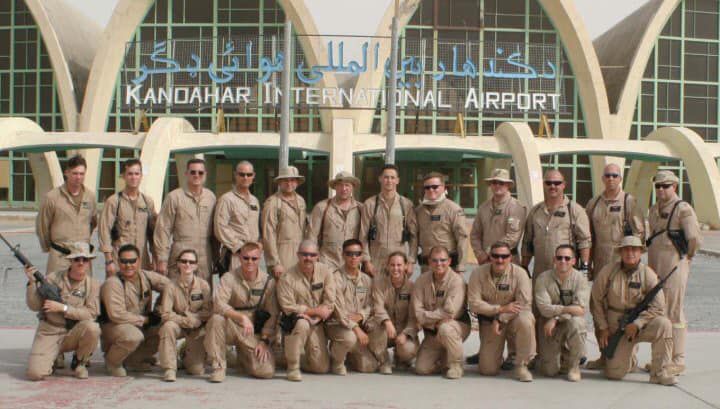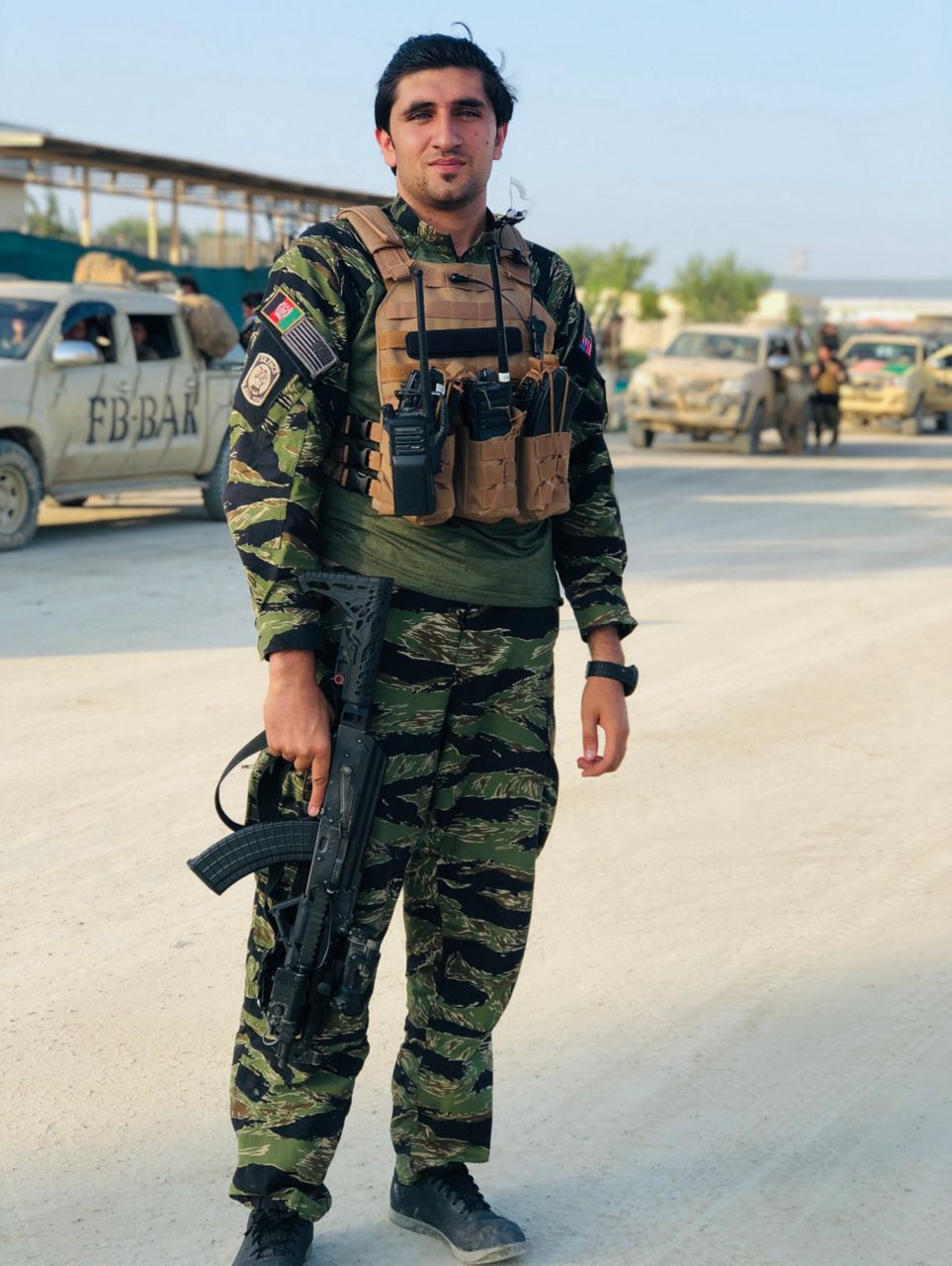AUSTIN, Texas — One year ago, on Aug. 15, the United States began its withdrawal from Afghanistan. American troops were out of the country by the end of that month. The 20-year-war was over.
On the day the last troops left, Habibullah Omari also flew out of Kabul. He was an interpreter for the U.S. Special Forces for three and a half years.
“When we were coming out, we were emotional. A lot of people were crying,” Omari said.
People were crying because they were leaving behind a place they fought hard for, and people they fought hard with. Omari, who’s 23 years old, said the darkest day of his life was seeing the flag of Afghanistan on the ground.
“I cried. My friends cried,” he said.
Omari’s journey to Texas took him from Kabul through Tajikistan, Germany and Virginia. After nearly three months of travel, Omari landed in Austin on Nov. 27, 2021. He decided to move to the Capital City because his uncle had lived there since 2014. His uncle, who had also served as an interpreter for U.S. troops, encouraged Omari to follow in his footsteps years prior. “I learned English words, vocabulary, everything,” Omari said. “And after that, my uncle motivated me to come and work with them: ‘You’re going to grow your economy too; you’re going to help your family; you’re going to help more poor people.’ So that’s why I decided to work with [U.S. troops].”
Today, in his apartment, Omari reflects on the war through pictures he’s saved on his phone. He misses his fellow soldiers, whom he calls family. He thinks withdrawing from Afghanistan was the right thing to do.
“A lot of people died over there. A lot of civilians died over there,” Omari said. “So that was the good plan that they took out all those people. War is done. There is no more war.”
There may not be war, but there is still plenty of death. Omari said he knows a “few hundred” people who were left behind and then killed by the Taliban.
“They were killed because they helped with U.S. Special Forces,” he said.
Rep. Tony Gonzales, R-District 23, served for 20 years, five of which were in Iraq and Afghanistan.
“Many of us, we grew up in Afghanistan,” he said. “We spent our college years in Afghanistan fighting terrorism, and preventing bad people from harming Americans and our allies. So that part will never leave me. It’s a large part of who I am. You know?”

Rep. Gonzales said the Americans and allies who are still in Afghanistan need to be rescued.
“Those that fought alongside us, our allies, absolutely deserve our energy and our attention in making sure that their lives are saved, essentially,” Rep. Gonzales said. “That’s what also deeply upsets me is how this administration has turned a blind eye to our allies as well, and just kind of wiped their hands clean of Afghanistan.”
Rep. Gonzales said allies shouldn’t be nervous about getting a visa, but noted that the U.S. has a “broken” immigration system.
“We have a long history of providing political asylum for those that are seeking refuge,” Rep. Gonzales said. “And sadly, because that isn’t being enforced at all, what you’re going to see is Afghanis get rolled up into that, and their visa claims may not be heard. And you know, here we had, in some cases, allies that fought alongside us that are going to be denied claims, where you’re going to have other folks that are just entering the country illegally that are going to have their claims be heard. This administration has failed in its immigration policy. And sadly, I think there’s going to be Afghan interpreters that are going to be impacted by that.”
Rep. Lloyd Doggett, D-District 35, said there’s an “incredible level of bureaucracy” involved in helping individuals come to the U.S. from Afghanistan.
“It is not surprising that, since we don’t have consular officials on the ground in Afghanistan anymore, that there are obstacles that the State Department and Homeland Security are very concerned that out of the thousands who have right to come here, we cannot permit one person who might turn out to be a terrorist or wrongdoer in some way from coming here,” Rep. Doggett said. “And so they’re very, very cautious about it, which is appropriate. But sometimes the bureaucracy in fulfilling that objective is just really a big challenge to our office, and more importantly, a challenge to those who served our country as Afghans and who have no choice but to face death at home or to get here to our country or another that can provide them a safe place in which to be joined with their families.”
Rep. Doggett doesn’t believe a ground presence is necessary again in Afghanistan. He said he supported providing humanitarian aid to the region, only if it was guaranteed to not go into the Taliban’s wallet. The Democratic congressman also said he hopes Afghan refugees who helped American troops are put on a path to U.S. citizenship.
Omari said he has a two-year work authorization but is waiting on his green card.

Rep. Gonzales said it hurts to relive the withdrawal.
“Because we knew what it took in order to get there. We knew we knew what we were up against. And we would have ceded all of that, for what exactly?” Rep. Gonzales asked. “This is a very painful topic. And it is one I hope the administration looks at and realizes the mistakes that they made, and it doesn’t happen again. And they acknowledge the people that are hurting, and it’s one that is very deep and will be with us for a very long time.”
The Republican congressman said the departure from Afghanistan was “botched.”
“We have devoted so much time, effort, energy, blood, treasure, and it would have taken, you know, maybe 5,000 troops at most to maintain the status quo,” Rep. Gonzales said. “And instead, we went a different direction. And that has caused, in my opinion, the region to be less stable. And I think, you know, there may be a time where our children are going to have to go back into Afghanistan, or other parts of the region. And so I think that that decision was a poor decision.”
Another Republican leader agrees.
“One year since the disastrous withdrawal in Afghanistan, and many of our Afghan allies are still trying to find a way out after President Biden left them high and dry,” Rep. John Carter, R-District 31, said in a statement to Spectrum News. “As a result of President Biden’s weak leadership, the Taliban is back in control and billions of dollars in equipment was left behind. Most importantly, 13 military families will never be the same. Today, we remember those brave service members and pray for their families. This tragedy should’ve never happened.”
Rep. Doggett said other leaders were involved in the U.S. departure from Afghanistan, in addition to President Biden.
“It’s only natural in this highly partisan environment, and in view of the retching pictures that we saw at the Kabul airport, that this would form the basis for an attack on President Biden,” Rep. Doggett said. “And while I certainly am not satisfied with what happened there, and he has to bear some responsibility for that, I think people forget that it was President Trump months before, who freed 5,000 Taliban, who cut our troop level by 80%, and actually issued an order that instead of last August, everyone had to be out by January 15. That was later extended to May 15, and President Biden extended it even further, trying to avoid the kind of chaos that happen there. But it’s still a scar–a deep scar that affects so many families and so many people that risked their lives and many who live lives in Afghanistan. I just wish the focus could continue to be learning the lessons of not spending 20 years in a place like Afghanistan, when there were more effective ways to protect the security of our families and the security of our country.”
Rep. Doggett said the U.S. should have withdrawn far earlier than 2021.
“We needed to go in, hit hard, and get out,” Rep. Doggett said. “And instead we lingered, tried to change Afghanistan into a place that it can never be, at least not with our outside pressure. And it’s not just the final horrible days at the airport. It is the horrible years in which billions of dollars and so much American and Afghani blood was shed that should never have happened.”
Opinions on the withdrawal differ. But Rep. Gonzales and Omari both have fond memories of the people they fought alongside.
“The bond that you have with your brothers and sisters that you serve with never, never ends,” Rep. Gonzales said.
Omari, whose parents still live in Afghanistan, said if the opportunity presented itself, he would help American troops again.
“They were helping us. They were helping us to get out all these people that were demolishing Afghanistan,” Omari said. “So I have pride. If there is any chance in the future, I will go back with them, and I will work with them for Afghanistan.”
For now, Omari is working in Texas and has plans to pursue a master’s degree. He hopes to have a future here.
“All those bad days… That’s gone,” Omari said.



